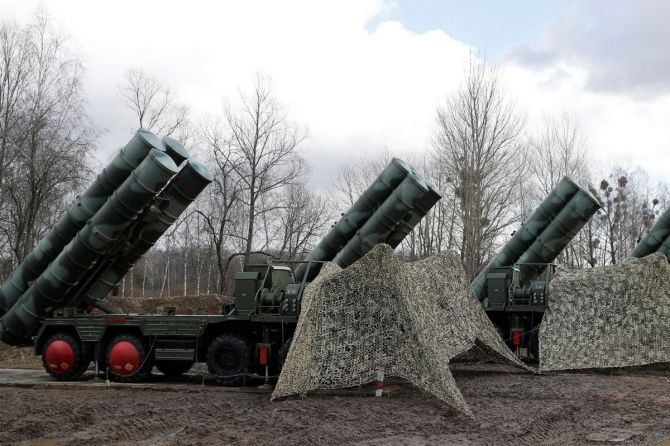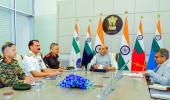'When one air force (India's) hits the other's airbases with impunity and that air force (Pakistan's) is not able to respond, then the air force, which has put the other's airbases out of commission, has won.'

Saurav Jha is an author and commentator on geostrategic affairs.
His first book The Upside Down Book of Nuclear Power was released in 2010. In 2015, he published The Heat and Dust Project, co-written with Devapriya Roy, which chronicles a backpacking trip through India on an extremely tight budget.
In 2017, he founded Delhi Defence Review, a think-tank focused on the analysis of technology, war, and ideas.
"After years of being derided, DRDO has come of age with Operation Sindoor and that is the greatest takeaway because DRDO is what keeps you future ready," Saurav Jha tells Rediff Senior Contributor Sheela Bhatt in an exclusive interview.
The concluding segment of a two-part interview:
A SWOT analysis of Operation Sindoor please.
The main win from Operation Sindoor is the performance of our indigenously developed systems.
Namely the Akash surface to air missile system, the Indo Israeli MRSAM, Medium range surface to air missile system.
The Indian Army's Akashteer Air Defence Control and Reporting System, which was also indigenously developed and which uses AI-based decision making. All of these worked rather well.
The performance of many small drones developed by Indian start-ups were noteworthy.
The BrahMos supersonic cruise missile which is produced by BrahMos Aerospace, an Indo- Russian joint venture with DRDO having a majority stake, showed why it is in international demand.
After years of being derided, DRDO has come of age with Operation Sindoor and that is the greatest takeaway because DRDO is what keeps you future ready.
For future conflicts, you need to depend on your own R&D set up of which DRDO is a central part.
And weakness...
I would say that in the air battle that happened on the first night, our rules of engagement should not have been restrictive.
It's not as if the Indian Air Force does not understand the Pakistan air force, it does.
We must also understand that Pakistan is not just some pushover country and that is why Operation Sindoor is also remarkable in some sense.
The Pakistan air force has worked heavily on networking its assets.
The SAAB 2000 Erieye AWACS that I mentioned earlier, they had nine of those in operation before Operation Sindoor began and have lost at least one since.
The SAAB 2000 was procured from Sweden and is quite good. And they have four more AWACS from China which are hangar queens. Those don't fly that much.
Did rumours of Pakistan felling a few Indian fighter jets affect India?
No! I don't think so. The Director General of Air Operations himself said that losses are a part of any conflict.
The chief question is whether you met your objectives or not.
Whether the forces lose one asset or two assets is not the criteria for judging the success or victory.

What role did Chinese equipment play?
Information warfare is now a natural corollary to an actual conflict today.
So we saw how the stock price of Avic Chengdu moved up and down during the course of this conflict.
The Chinese ground-based air defence systems obviously failed otherwise we wouldn't have been able to hit so many of Pakistan's air bases with impunity.
Their HQ-9BE and HQ-16FE are clearly not very capable. Their air to air missiles are better.
The PL-15E should not be scoffed at. It is not some game changer by itself either because the Pakistanis have worked very hard on networking their assets and that is what counts more.
They could move data from one platform to the other quite readily.
We can do it also, naturally. We have also done excellently as we have shown in Operation Sindoor.
What we need to realise here is that when we fight a sub-conventional air war with them, where the rules of engagements are restricted, we won't really have the kind of advantage we want.
And that is because they have a well-networked system.
Does Operation Sindoor bring a new opportunity for India?
The opportunity lies first of all in embracing indigenisation in toto. This notion that I will buy ten jets from here and five from there will not work.
This is an era of 'system of systems' warfare. The whole must be greater than the sum of parts.
So it's not as if one J-10 and one PL15 and one Akash makes the difference. No, It's the system as a whole.
And if you have disparate sources of military equipment, something from France, something from Russia, something from America, it is that much more difficult to integrate because they cater to different standards.

What has India learnt about emerging threats from Operation Sindoor?
The main threat is that the Chinese aerospace sector is obviously nothing to be laughed at.
Their ground based air defences are still poor I would say, they are not as good as what the Russians have and not as good as what we have either.
In some cases we are better than the Russians now because of the long investment in such programmes.
But China's air-to-air missiles and their fighter jets can't be called poor, they are quite decent.
So we must understand that the wars of today under the nuclear overhang will be air and space wars fought with long range vectors, long range missile systems and even long range ground-based air defences.
We are more prepared in that realm which is why we need to focus on creating more ground -based air defences and a rocket force.

What about Pakistan's situation?
As I said, the Pakistan air force has integrated its assets well.
It's another matter that some of its assets were of very poor quality like the ground based air defences which we either jammed or destroyed and Pakistan could not stop our BrahMos or SCALP strikes.
However, if you keep aside the old Mirages of which they have many, they do have a decent fighter pool and have worked very hard on networking their assets.
Their main weakness is that they still seem to think that air power is about fighting air battles in the sky.
We strategically defeated them in the air campaign.
When one air force (India's) hits the other's airbases with impunity and that air force (Pakistan's) is not able to respond, then the air force, which has put the other's airbases out of commission, even if for relatively small windows of time, has won.
Why couldn't Pakistan mount a response?
Why couldn't it stop Indian attacks?
What surprises me about Pakistan is that they continue to follow a doctrine where they think they will create some losses for India initially and then they will get America to pull India back from the brink.

What surprised you about Operation Sindoor?
The main thing about Operation Sindoor which positively surprised me was the density of our air defences and our own networking.
The fact of the matter is our air defences shot down ballistic missiles, all kinds of drones, which were sent in swarms, shot down 300 mm artillery rockets launched from multi barrel rocket launchers.
That shows we have networked our air defence systems very well. And see most of our defence systems are either indigenous systems, JV systems with Israel or things from Russia for which we may have the source codes.
So we have networked all of that well.
We can't comment on the Rafale at this point in time because the government has not said anything about it. This is an era of limited war under a nuclear overhang.
There will be short, sharp, conflicts. The only reason the Russia Ukraine war has gone on for so long is because one side is not a nuclear entity.
Ukraine gave up its nuclear weapons as part of a so-called peace guarantee and security assurance in the mid-1990s.
The conflict between Iran and Israel was also calibrated, it was episodic.
Even in the case of India and Pakistan, we find that nuclear deterrence ultimately played a role in winding down the matter.
But having said this, in the case of India and China, the nuclear threshold is much higher.
India should be ready to face a joint air campaign by the Chinese and the Pakistanis. We should not say that this is far-fetched, alarmist.
 IMAGE: Saurav Jha
IMAGE: Saurav JhaWhat do you think about the weapons business: The West versus China?
It's quite clear that there is an information war raging on this front. That's why you had so much reportage.
Some Chinese leaning places hyped up the J-10 and the PL-15E. It's a different matter that France 24 seems to have scored an own goal with an article on its website hyping the J-10CE.
I can guarantee that whatever be the case, whether it be Dassault or Avic Chengdu, they will try to pretend as if their stuff worked very well while that of the other's did not when they make presentations around the world.
African nations have bought a lot of things from China over the years, they don't work well.
Now the truth is African nations are looking towards India as a source for equipment. Operation Sindoor is India's moment to properly make offers.
Defence attaches from 70 countries have already been briefed in New Delhi about Operation Sindoor but that is nothing.
Much more detailed presentations should be made to friendly countries across the world about the performance of India's indigenous weapon systems.
Indian defence exports are going to touch 3 billion dollars soon, but the target is much more than that.
Operation Sindoor is not over, officially.
It should not happen in a way that enemies imagine. And we should not move up the escalatory ladder in a manner which is predictable.
We should shape the battlefield, or shape the enemy's behaviour in a different sort of way.
The morale of our armed forces is high. They know the damage they have inflicted on the enemy and what more they can do.
It's not about revenge. It's about justice. This is how the Indian military would look at it.
Feature Presentation: Aslam Hunani/Rediff.com










